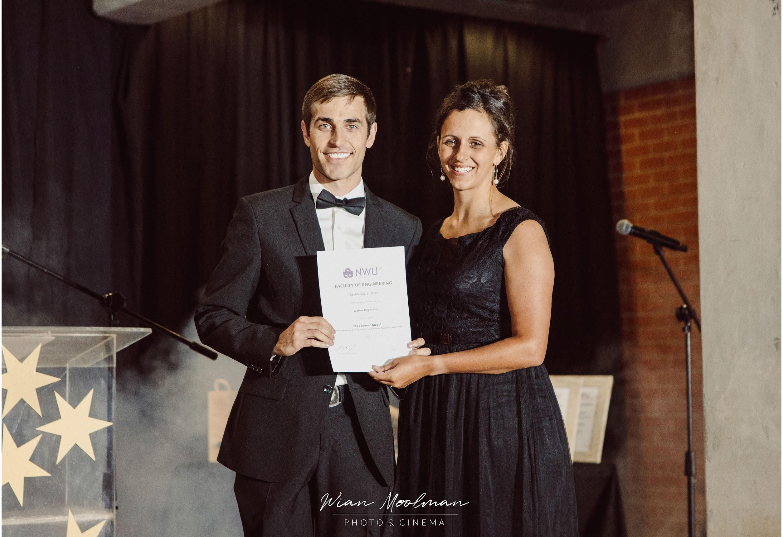By Aldrin Ngorima
Developing a novel technique to support a South African company to better deal with noisy call centre audio, resulted in a S2A3 Master’s Medal for recipient, Walter Heymans. The medal is an annual award given to the most exceptional research student graduating at the Master’s level in a scientific field from each South African university. The announcement was made at the annual NWU excellence awards event late last year, and recently celebrated at the awards evening of the Faculty of Engineering, where Walter conducted his Master’s studies.
Walter’s dissertation ”Automatic speech recognition of poor quality audio using Generative Adversarial Networks (GANs)” addressed a specific challenge for practical automated speech recognition systems: dealing with noisy conditions possibly with very different acoustics as those observed during training. The research was conducted in collaboration with Saigen, a South African commercial speech recognition company. By developing a new technique, “Feature transformation using a guided GAN,” Walter demonstrated the ability to compensate for different acoustic environments in a lab environment, before evaluating the technique on real-world data from a challenging call centre environment.
In addition to the dissertation, Walter created a repository containing a software implementation of the technique and published two papers, one of which was in a highly regarded international journal, while the other was presented at a national AI conference and subsequently included in an accompanying journal of best conference papers.
Walter’s supervisors were Prof Marelie Davel, director of the MUST Deep Learning research group, and Dr Charl van Heerden, co-founder and CEO of Saigen. Prof Davel is pleased by the formal acknowledgement of Walter’s work: “His excellence in his work, dedication to his studies, multiple research contributions and overall commitment to the activities of the NWU, makes him a truly outstanding individual. He is a worthy recipient of this award”.
Walter is currently a software engineer at Corigine, Inc., a prominent provider of electronic design automation tools, USB IP, and networking products. He began his career at the company by contributing to high-profile projects such as the Linux kernel and the Data Plane Development Kit. Walter recently led a team in the development of a network interface card performance benchmarking tool, to compare the performance of programmable network interface cards manufactured by various companies.
Walter notes that his inspiration to pursue this research topic came after being astonished by the power of GANs. Upon hearing about the potential to work on this topic with Saigen, he immediately jumped at the opportunity. Asked about winning the S2A3 medal, Walter expresses gratitude and excitement. The nomination itself was an honour and he is thankful for everyone who helped him during his studies to achieve this.
Walter noted the benefits and advantages of studying with the MUST Deep Learning research group, “The study leaders at MUST are exceptional. They provide very good guidance and ideas throughout your studies. The research group is very focused and promotes collaboration and sharing of knowledge. This has a major benefit for individual researchers, not just for the academic knowledge received from more experienced PhD students, but also for developing relationships and making new friends.”
To up-and-coming researchers, Walter emphasises the significance of maintaining a balanced life, citing his participation in extracurricular activities such as working on the NWU's solar car project during his postgraduate studies as a means of taking a break from research and engaging in physical work. He also stresses the importance of planning ahead, with research being carefully scheduled months in advance to meet major milestones and finish on time. Walter believes that working hard was essential to maintaining motivation and ultimately completing his work on schedule.
* MUST Deep Learning is a research niche area that studies the theory and application of deep learning. Deep learning is a family of machine learning techniques (originally inspired by the idea of artificial neural networks) that nowadays consist of large, complex, layered models that excel at solving ‘human-like’ tasks. It is one of the core technologies driving current innovations in Artificial Intelligence.

Walter Heymans with Prof Rojanette Coetzee at the Faculty of Engineering 2023 awards evening
